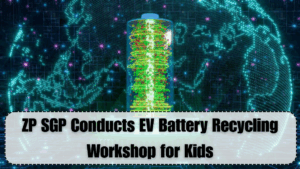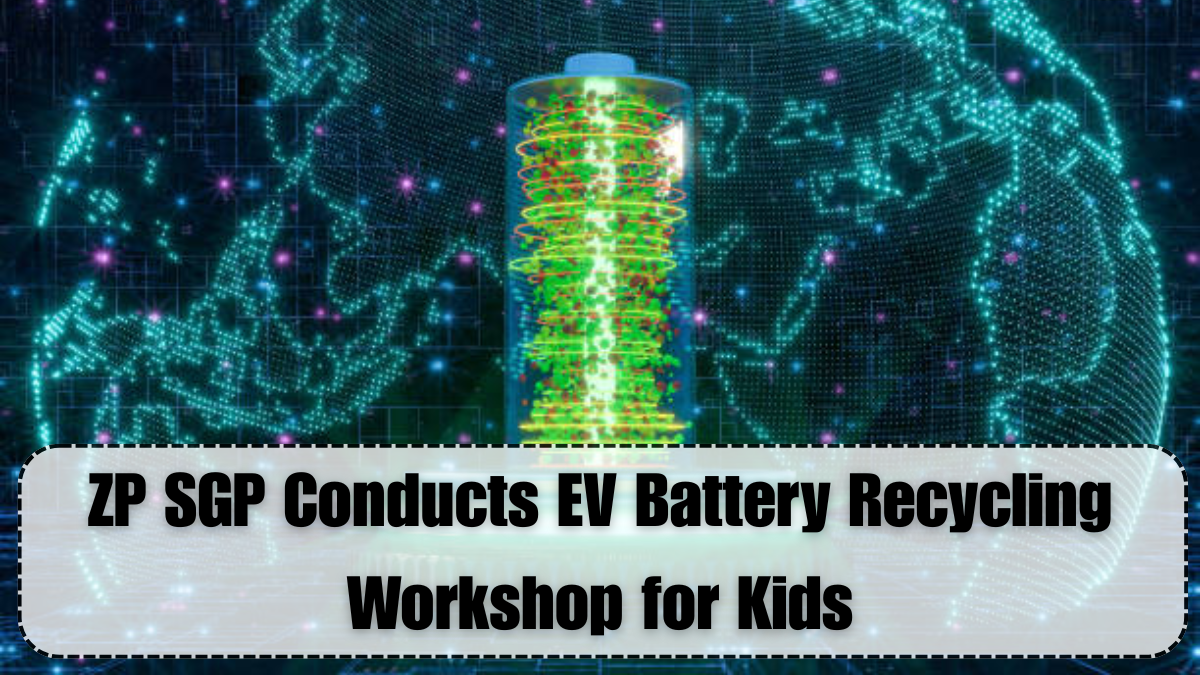Battery recycling workshop initiatives have now made their way into primary education, as ZP SGP School hosted a unique and engaging recycling awareness activity for children. With the growing presence of electric vehicles across India, the school took a timely step to educate young minds on battery safety, environmental protection, and the need for responsible waste handling.
Organized as a half-day school project, the workshop brought in interactive models, animated presentations, and hands-on demonstrations to simplify the concept of EV battery recycling. It was attended by more than 120 students from classes 4 to 7, along with teachers, parents, and local environmental volunteers. The goal was simple: make battery safety and recycling a fun, memorable, and community-driven learning experience.

Teaching Battery Safety at the Grassroots Level
Children often use battery-powered toys, gadgets, and small electronic vehicles. However, very few understand the risks associated with improper battery disposal or exposure to damaged lithium cells. This battery recycling workshop helped address that knowledge gap by creating a safe and practical environment for learning.
Key elements of the session included:
-
Visual demonstrations of swollen and leaking batteries
-
Simple animations showing how batteries are made and used
-
Group activities on separating battery waste from regular trash
-
Role-play exercises on handling accidental battery leaks
-
Tips on storing batteries safely at home and school
By focusing on real-life scenarios, the workshop made battery safety easy to understand—even for children.
Making Recycling Interactive and Fun
ZP SGP School designed the school project with child-friendly language, colorful materials, and engaging storytelling. Students were divided into teams and tasked with building their own battery collection boxes using recycled cardboard and labels. They were then taught how to identify different types of batteries and where they can be safely discarded.
Activities that stood out included:
-
“Battery Hunt” – a game where students found used batteries at home
-
“Sort and Learn” – a sorting task to classify rechargeable vs. non-rechargeable cells
-
“Recycle Race” – a relay activity where children transported batteries to model recycling stations
Through gamification, the battery recycling workshop became both educational and exciting.
Collaborations and Real-World Demonstrations
To add real-world value to the event, the school invited technicians from a local e-waste recycling firm. These experts showcased the dismantling of small EV battery cells and explained how valuable metals like lithium and cobalt are extracted. Children witnessed how even a damaged battery could be recycled rather than thrown away.
This reinforced important lessons about:
-
Resource recovery through recycling
-
Environmental harm caused by burning or dumping batteries
-
Importance of reporting damaged cells to adults
-
Community responsibility in battery safety and awareness
The workshop ended with each child receiving a mini “Battery Hero” certificate, acknowledging their role in protecting the planet.
A Model School Project for Others to Follow
ZP SGP’s initiative is now being looked at as a model school project by other Zilla Parishad schools in the region. Teachers have submitted a documentation report to the District Education Board, recommending the integration of battery recycling workshops into the science curriculum on an annual basis.
Parents also reported that children were actively checking batteries at home and sharing recycling tips with siblings and neighbors. The program has proven that environmental responsibility can be taught early—and joyfully.
FAQs
What is the goal of the battery recycling workshop at ZP SGP?
The workshop aims to teach children about battery safety, proper disposal, and the importance of EV battery recycling through fun and interactive methods.
How was the workshop conducted?
Using animated videos, hands-on games, classroom demonstrations, and group tasks that explained the dangers and management of battery waste.
Who participated in the school project?
Over 120 students from classes 4 to 7, teachers, local e-waste professionals, and volunteers from the environmental science community.
What did students learn during the session?
They learned to identify battery types, understand safe handling practices, recognize signs of damage, and locate safe drop-off zones.
Will similar projects be done in other schools?
Yes, the success of this school project has encouraged other ZP schools to adopt similar battery recycling workshops in their educational programs.
Click here to know more.
